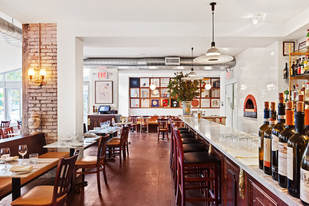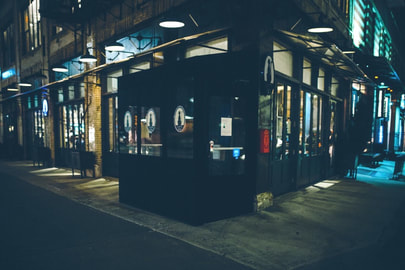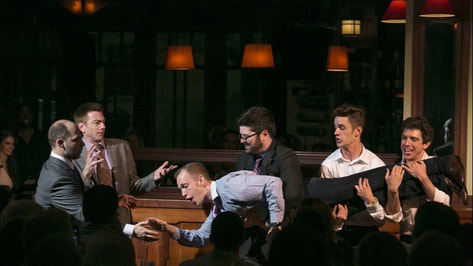Three Restaurants Go Down in One Month
 It's midnight at Mezzogiorno
It's midnight at Mezzogiorno
On this blog, I've written a lot about enterprise on Broadway, so much so that there's a whole category at the right where I tag just those posts. (To dive in, you can see, in particular, Part 1, Part 2 and Part 3 of the series I call "Empty Storefronts and the Changing Streetscape.)
Generally speaking, the series has chronicled the uptick in long-empty retail spaces, the loss of Mom & Pops, and the darkening of movie houses. Now I turn to the shuttering in October of three dine-in restaurants in such quick succession that if leaves me wondering if a new trend is afoot.
Either way, gone are Mezzogiorno, Il Gatto Nero and Henry's; all of these folded up shop in October.
Notoriously hard to sustain, eateries represent a key piece of the retail ecosystem. But they are as sensitive to rent and labor increases as any other commerce. However, unlike the old Broadway shopper's pivot to patronizing etailers, New Yorkers still dine in their neighborhoods.
Take for example, the closure on October 14 of Mezzogiorno (2791 Broadway) which was in the old Indian Cafe space north of W. 107th Street. After a very lengthy, costly renovation, this gentrifier of an Italian spot opened in 2015 just as its owners were preparing to close the chic, decades-old SoHo location. A surprise to all, I think, they looked to Bloomingdale to resettle. I concluded at the time that the rent savings made the uptown operation viable. And yet three years later, it has closed. Perhaps Bloomingdalers didn't care for the higher price point or the flush old regulars didn't find their way uptown. The clock struck mezzanotte at Mezzogiorno, and their 31-year run is now over.
 Il Gatto Nero stood where once you could by discounted bedding.
Il Gatto Nero stood where once you could by discounted bedding.
Yelp reviews praised each of these places (though there was the legendary takedown or two). And they attracted nods of approval from the Michelin guide, for what that's worth. They just didn't keep us pouring through their doors.
 Famous for building community, Henry's offered raucous "Sing for Your Supper" nights.
Famous for building community, Henry's offered raucous "Sing for Your Supper" nights.
Under Rinehart, Henry's was, to many, a Cheers -- the sitcom bar made famous by an ensemble of wry barflies yearning for a 'third place' to take a break from their worries. Hopping bar scene. Sports mecca. Brunch spot. Outdoor cafe. Neighborhood sing-in club. An ample Thanksgiving table away from the hearth or for the weary home cook. A place where if they didn't know your name, at least they acknowledged you as a regular. Henry’s had it all and was a big player in the community. And if that isn't enough, Henry himself was an advocate for healthier school lunches.
I don't doubt that many felt Henry's had its gentrifying side when it first took root. It was always a bit above other local haunts in terms of cost. I noticed that prices crept upward recently. Perhaps to fend off what became an inevitable battle to reap profit out of such expansive square footage. Alas, Henry's is no more.
To paraphrase James Carville, I wonder if what I am observing isn’t along the lines of the temple-thumping exclamation: “It's the rent, stupid!” — similar to the problem with the Mom & Pop die off. But the answer may be more complex. Restaurants might be competing with the availability of high-end prepared foods that come from Whole Foods or West Side Market, or with the quality specialty ingredients home cooks can now find at Trader Joe’s and H Mart, among other groceries.
As I say above, restaurants don’t yet seem to be victims of etailers like Amazon, but is something other than rent pressure weighing on the old-style dine-in spots? Is it that the market only bears up to a certain menu price point around here? Or is it just a matter of time before more Serafinas move in, more large restaurants go vacant, or just more turnover occurs?
Fortunately, city council members regularly take up the topic of commercial rents, mindful of all the vacancies. Unfortunately, the needle never moves much. It seems early to say, but we might be seeing a little progress with new legislation sponsored and small business committee hearings held by Ydanis Rodriguez. Councilmember Helen Rosenthal is also a proponent.
Called the “Small Business Jobs Survival Act,” the bill aims to define conditions and requirements for commercial lease renewal negotiations, requirements for lease renewal terms, arbitration-triggering conditions, limits on security deposits, and prohibitions on landlord retaliation.
I’ve been writing about the changing streetscape a lot because some days I feel like we’re in the 11th hour, the 59th minute of what I view as a retail crisis on Broadway. And while restaurants may not be as endangered as Mom & Pop retailers, I truly hope we don't wait until the last minute to solve the economics of Broadway. We can see with our own eyes that the law of supply and demand has been subverted. But it can be fixed. But sadly not in time to sing for our supper at Henry’s.

 RSS Feed
RSS Feed
